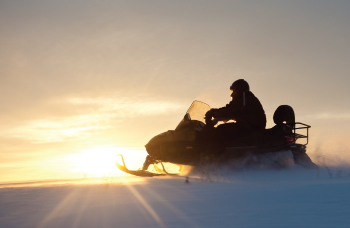MARSHFIELD – More than a 1,000 people suffered snowmobile-related injuries during a five-year time period in northcentral Wisconsin, but the true number of injuries was likely under-reported due to lack of comprehensive reporting from hospitals and clinics, and snowmobilers’ failure to self-report injuries, according to a study conducted by the Marshfield Clinic Research Institute (MCRI).
From Nov. 1, 2013, through April 30, 2018, there were 1,013 snowmobile-related injuries, with 264 (26%) cases hospitalized and 749 (74%) treated as outpatients, according to the study published in Wisconsin Medical Journal. The study was led by Epidemiologist Jennifer King, from the Research Institute’s Center for Clinical Epidemiology and Population Health, and former MCRI Epidemiologist Oluwatosin Olaiya and former Marshfield Medical Center Trauma Surgeon Daniel Cullinane.
Researchers calculated the approximate rate of injuries using data collected from Marshfield Clinic Health System medical records centered around its hospitals in Marshfield, Park Falls and Ladysmith, and the number of snowmobiles registered each year in that area. Marshfield Medical Center in Marshfield is a Level II trauma center that admits and treats serious traumatic injuries from across central and northern Wisconsin where snowmobiling is a popular activity. The Health System also has a wide network of outpatient centers and local hospitals across the same area.
“While prior studies often looked at only the most severe injuries, we highlighted the full scope of snowmobile related injuries and estimated injury rates,” King said. “Studying mortality or only severe snowmobile injuries underestimates the full burden of the injuries on patients, their families, and health systems that provide care. Our study showed that only 10-20% of medically treated snowmobile injuries in Wisconsin are reported to the DNR.”
Since 1971, the state of Wisconsin requires individuals involved in snowmobile-related injury events that result in medical care to self-report the incident to law enforcement officials and the Wisconsin Department of Natural Resources. However, individuals may not be willing to report the incident if alcohol or other drugs were used at the time.
“We encourage snowmobile operators to enjoy the sport but to operate these large, heavy, fast machines cautiously to protect themselves and other riders from injury,” King said. “Wear a helmet, follow all rules and regulations for trail use and etiquette, use good judgement on a safe speed for the conditions, and avoid use of substances that may impair judgement or the ability to control the machine when riding a snowmobile.
“Also, we encourage individuals to report any accidents involving injuries to the proper authorities as soon as possible.”
The study was conducted in a way that can serve as a baseline to study future interventions to prevent snowmobile injuries. In addition, the results from this study may be useful for resource allocation decisions at regional hospitals and for trauma teams who care for patients with snowmobile related trauma.

